
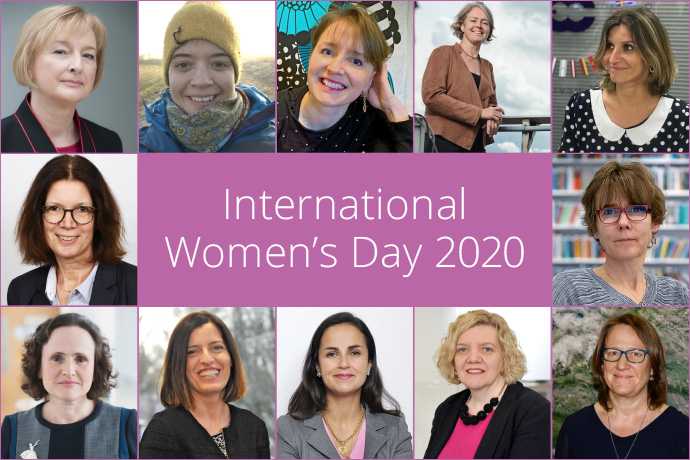
To celebrate International Women’s Day 2020, ECMWF asked a selection of experts and leaders in the world of meteorology to tell us their story – what inspired each to take the journey that led them to where they are today, and what advice they can give to the new generation of meteorologists coming after them. Each day in the week running up to International Women’s Day, we published new stories until we had a full set by Sunday, 8 March.
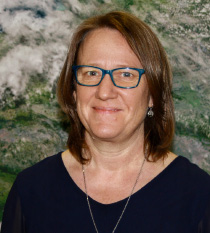 Professor Sarah Jones is Research and Development Director at Deutscher Wetterdienst
Professor Sarah Jones is Research and Development Director at Deutscher Wetterdienst
“My fascination with the weather comes from sailing; my first real appreciation of the challenges and importance of predicting the weather came from the loss of life in the Fastnet Race in 1979. So perhaps it was inevitable that this, along with an aptitude for Physics and Maths and the recognition of the societal need for improved weather forecasts would lead to a career in meteorology.
I certainly could not have predicted where this would take me: from fundamental research into why weather systems develop, to designing research programmes and mentoring early career scientists as a university professor, before moving on to strategy and science management at a national weather service, and all of this in an international environment.
Each step along the way has brought new challenges – whether needing to gain and apply knowledge, becoming effective in unfamiliar environments or balancing personal and professional life. My scientist’s approach to solving problems has been important when working to overcome these tests. And the people around me, my mentors, colleagues, students, friends and family have all made the difference throughout my career, guiding, advising, challenging and supporting me along the way.
And at the end of the day, the fact that I am part of a major international effort to make our knowledge available to all, where it is needed the most, is really what counts.”
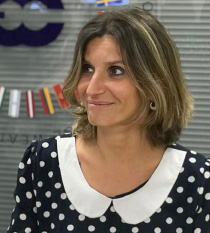 Irina Sandu is a senior ECMWF scientist leading the team working on the representation of atmospheric processes in ECMWF’s forecasting system.
Irina Sandu is a senior ECMWF scientist leading the team working on the representation of atmospheric processes in ECMWF’s forecasting system.
“The passion for science combined with a passion for travel and for encountering new people with a diversity of backgrounds drove my European journey and led me to where I am today.
After completing undergraduate studies in Romania, a PhD in France and an Alexander von Humboldt postdoc in Germany, I am now leading the group working on the representation of atmospheric processes in the ECMWF forecasting system. This role is fascinating in so many ways, but what makes me most passionate about my work is the impact it has on people’s life through forecast quality, and the stimulating interactions with so many top scientists across the organisation and our Member States.
My main advice to any scientist would be to always dare to ask questions and be critical, even if being an error-detector is not always easy. As pointed out by Simine Visire in this recent Nature article, fact-based criticism is healthy and necessary for advancing science and we should do more as a community to support it.”
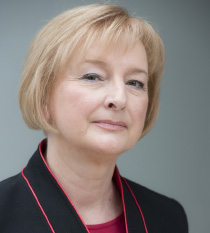 Branka Ivančan-Picek is the Director General of the Croatian Meteorological and Hydrological Service (DHMZ) and the first female Permanent Representative of Croatia at the WMO.
Branka Ivančan-Picek is the Director General of the Croatian Meteorological and Hydrological Service (DHMZ) and the first female Permanent Representative of Croatia at the WMO.
“I have been working for DHMZ since 1979, first at the Department of Weather Forecast, and then from 2001 as the Assistant Director, where I coordinated the department’s research and key operative tasks.
So how did I get here? Ever since I was at school I have loved mathematics, physics and environmental science and specifically their practical application in the real world – meteorology brings this core knowledge together. My decision to complete a PhD in Adriatic atmospheric mesoscale vortex generation at the Faculty of Science at the University of Zagreb confirmed to me that my career would focus on weather forecasting. I am now pleased to be supporting the next generation of weather scientists by mentoring graduate and doctoral students at the University and participating in faculty committees for grading graduates.
A central challenge in my life, as I expect is the case for many women, has been the balancing of family commitments; bringing up two successful daughters, and my obligations and responsibilities at work. Family support has helped and continues to help me feel secure and comfortable both in my life at home and at work – getting this right is key.
My recommendation to young women in science today is this: to properly invest enough energy in work you must believe in yourself and be sure that you can and will succeed. This should not be dependent on support from others and no one should or has the right to put you down. And please remember that your failures are sometimes an essential part of your journey to success; just pick yourself up and start again – this will get you closer to your goal.
With this in mind, success should not be dependent on what gender you are.”
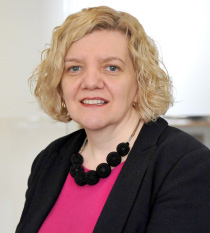 Sinead McAtavie has been leading ECMWF’s finance team since 2014
Sinead McAtavie has been leading ECMWF’s finance team since 2014
“Despite questioning my own mathematical skills at school, I have always loved working with numbers.
I started my career as part of a large all female team in a transport company in London, processing and filing invoices, and as I was doing this work I noticed that all the accountants around us were male. Having already studied Accounting at University, I decided then and there to move to the accounting side of the office. I knew that I could succeed at it, and so started harassing my male colleagues until they gave me extra (unpaid) work to help them with their analysis, and then studied during my weekends to get the professional qualification I would need to proceed.
Today, after a 25-year career in finance in different organisations and industry types, hindsight teaches me that, as a woman, climbing to the top of a complex finance team in a large organisation involves both determination and flexibility.
Although Finance Managers do often still tend to be male, I’ve always felt equally treated and respected for my achievements as a professional. When I first started my career in finance I was advised to come across as being tougher to emulate my male counterparts. However, I made a conscious decision not to do this, feeling that it was important to be true to oneself and act as you feel is right in a specific situation.
Working with men and women throughout my career, it has often struck me how many strong and very capable women often don’t have enough confidence in their own abilities, frequently downplaying their own skills. Whilst perhaps this is a natural trait, I truly believe that it is important to be proud of who you are, and have belief in what you can achieve and not to try to hide it.
The two key things for me are to enjoy my job and to be true to myself in all I do – and I can honestly say that working here at the Centre allows me to achieve both. And yes, OK, although there are of course days that I’d rather be on a beach sipping a cocktail, I do enjoy my job and I love working here at ECMWF.”
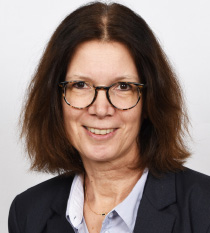 Martina Reckwerth is Head of MeteoLux at the Air Navigation Administration of Luxembourg.
Martina Reckwerth is Head of MeteoLux at the Air Navigation Administration of Luxembourg.
“In 2013 I was nominated Head of Luxembourg’s meteorological department, MeteoLux. This appointment was an important moment for our organisation as I was the first woman in this leadership position in our 70-year history.
When I joined the organisation (then called the ‘meteorological service’ of the Air Navigation Administration) in 2004 my focus was on aeronautics, and I was, as one would expect in the area of aviation at the time, integrated into a team mainly composed of male colleagues.
Although my gender was in no way a barrier to my work within the department I was, and continue to be, very aware of the significant imbalance of genders working within the field. Since then I have had the opportunity to actively participate in our rapid development at the department. The big change in our workload and the number of tasks we were responsible for came when the national meteorological service was assigned to us under our new name ‘MeteoLux’.
Now that I hold the position of Head of MeteoLux I am keen to challenge the imbalance in diversity and gender by making a special effort to invite both women and men to enter the field of meteorology. I am very proud of my entire team at MeteoLux; they are an important entity and play a key role in Luxembourg, providing vital support for national civil protection across our country. We want the best of the next generation to continue this work – and that means reaching out to all genders.”
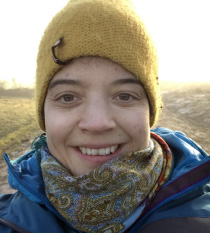 Freja Vamborg is a senior scientist with ECMWF leading activities in the crossroads between data, science, communication and outreach
Freja Vamborg is a senior scientist with ECMWF leading activities in the crossroads between data, science, communication and outreach
“Having grown up in an environment that generally supported education, it was clear for me that I would eventually go to university, being a woman had no part in that equation. However, once I did go, I was equipped, thanks to one woman – my mum, with copies of the classics of feminist literature, a reading list I can recommend to all. It was also she who encouraged me to do something climate change related, as a way to deal with the early bout of climate anxiety that I was suffering from at the time.
Here at ECMWF, I work for the Copernicus Climate Change Service (C3S), so I am proud to say that I’ve stayed in that thematic. A large part of my job at the Centre is to act as a link between C3S data and science and our outreach and communication activities. The main recurring activities that I deliver are the widely circulated monthly climate bulletins and the co-production of content for the C3S media partnerships with Euronews and CCN. I am also responsible for the annual European State of the Climate report.
If I were to encourage anyone on anything career related, then it would be to look away from the typical way of thinking of careers, as in always striving ‘upwards’, and rather to focus on what it is that really means something to you.”
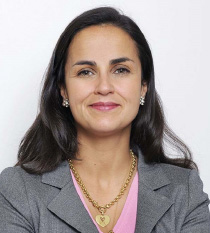 Virginie Schwarz has been the CEO of the French Met Service Météo-France since September 2019.
Virginie Schwarz has been the CEO of the French Met Service Météo-France since September 2019.
"As an engineer by training, I chose to join the French civil service at the beginning of my career so that I could specialise in public policies within the areas of energy and environment that I was most interested in, notably climate change. This decision has taken me along a hugely rewarding career path, allowing me to focus my energy on working to understand and mitigate the impacts of a changing climate on our society.
During my work with the civil service, I have been fortunate to occupy a number of senior positions including Deputy Director General at ADEME, the French public agency in charge of implementing public policies in the areas of energy, climate change, and the environment. Following this I was posted to New York between 2007 and 2009, at the United Nations Development Program (UNDP) as senior advisor on climate change mitigation, where I led the design and launch of an initiative to help sub-national authorities to develop mitigation and adaptation climate plans.
From 2014 to 2019, I was Director of Energy in the French Ministry of Environment in charge of energy policies and regulations concerning energy generation, distribution, transport and sales for all sources of energy as well as bilateral and multilateral international relations in the field of energy.
More recently I have been honoured to be able to use my experience in this complex field to design the new French national strategy for energy and climate and be appointed the French representative in the governing board of the International Energy Agency.”
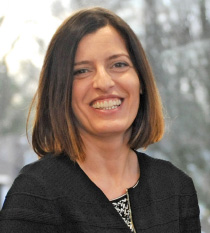 Claudia Vitolo is an ECMWF scientist working on forecasting weather-driven hazards and is co-founder of global communities promoting gender diversity in science and industry.
Claudia Vitolo is an ECMWF scientist working on forecasting weather-driven hazards and is co-founder of global communities promoting gender diversity in science and industry.
“Ever since I was a child, I have been thirsty for knowledge and my favourite activity continues to be learning. Although I studied civil and environmental engineering, I have always been fascinated by geospatial data science and programming. I never received formal training; I learnt about Geographical Information Systems (GIS) on the job and taught myself how to programme using a Casio calculator about 20 years ago. Since then I have taught GIS and Data Analysis at university and mastered numerous programming languages while working as a scientist and developer for industry and in academia. I now provide ECMWF with expertise on geospatial data analysis applied to high-impact weather, to forecast dangerous events such as wildfires and floods. The nature of my job is very creative and I’m always on the quest for new and innovative open source technologies to experiment with, to make my workflows more reproducible and efficient.
As my career progressed, I often found myself isolated and even intimidated in what was a male-dominated environment. To address this, I began advocating for gender diversity in science and industry. I also became interested in community building and about four years ago I co-founded R-Ladies Global, an organisation that promotes gender diversity in the community of one of the most popular programming languages for data science: the R statistical language. Today the organisation has more than 60,000 members worldwide and my involvement has earned me Microsoft’s Most Valuable Professional award for technical community leaders in both 2018 and 2019. This participation has also led to other valuable opportunities, including serving as a voting member on the R-Consortium Steering Committee and helping other similar communities get off the ground, including WomenInGeospatial, a professional network promoting gender-equality in geospatial industry and academia.
My tip for a rewarding career as a scientist? Do not be afraid to follow your heart and explore other fields. Career paths do not always follow a straight line. But the skills you gain along the way can help you in unexpected and unpredictable ways!”
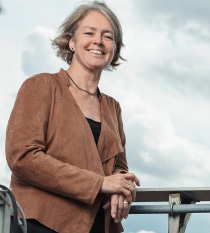 Marianne Thyrring is Director General at the Danish Meteorological Institute (DMI).
Marianne Thyrring is Director General at the Danish Meteorological Institute (DMI).
“Although it might seem unusual that a political scientist without a meteorological background was appointed Director General at DMI, the reason is that, put simply, leadership is my profession. When I was appointed, I felt like the ‘oddest woman in the Met-World’ as I was not an expert in weather, yet I was leading a big group of mostly male staff who were the best in the field. I had been chosen as I had honed high-level management skills over many years, primarily in the Danish Ministry for Environment as Permanent Secretary and then in the European Commission, and these were skills DMI really needed. Having this experience permitted me to add vital political and managerial skills into the mix – adding to what DMI’s specialists, experts and scientists do best: highly accurate weather prediction.
Over time my meteorological knowledge grew and, in the meantime, my managerial and political experience has been key for our scientists to get our products out faster, and closer, to our citizens. Finding a route through to reach citizens has been achieved via a combination of good science and the opening of political doors – a successful cocktail even if a little unusual for a national meteorological service! I am proud of being Director General of DMI. Leading the many world-class scientists here who work tirelessly to improve weather services and protect citizens and their property throughout the Kingdom of Denmark has been, and continues to be, an absolute honour.”
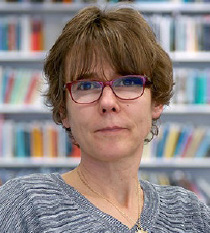 Patricia de Rosnay is an expert in land surface data assimilation and Leader of the ECMWF Coupled Assimilation Team.
Patricia de Rosnay is an expert in land surface data assimilation and Leader of the ECMWF Coupled Assimilation Team.
“Ever since I was a child I have been fascinated by our natural environment, observing nature, even trying to measure and to monitor rainfall, temperature and daylight, and trying to understand processes behind the weather. This led me to study maths, physics and fluid mechanics at university, from which I graduated with a Master’s degree and received a PhD in meteorology/oceanography – a natural path to follow a career in meteorology.
Has my gender been a barrier to getting here? I can honestly say ‘no, it has not’. I was encouraged by my family to study topics that I was the most interested in. As the years went by, as a woman in science at university, I was always in a minority, but I have never felt discriminated against because I was surrounded by people with the same interests as me in science. It is still the case as a woman in weather science at ECMWF; whether we are men or women, we all share a deep passion for weather sciences.
I have worked at ECMWF for almost 13 years now, arriving in 2007 as a project scientist and progressing to where I am today, Leader of the Coupled Assimilation Team. I am very grateful to the Centre for giving me the opportunity to do what I love the most – delivering world-leading research in an operational ‘real-life’ context, offering direct benefits to society. The way we go about our weather and climate sciences here is truly multidisciplinary, involving maths, physics and computing sciences, all applied to understand and to represent the Earth system in our predictive models.”
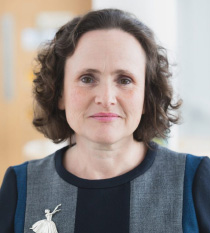 Professor Penny Endersby MA CEng CPhys FInstP, is Chief Executive at the UK Met Office.
Professor Penny Endersby MA CEng CPhys FInstP, is Chief Executive at the UK Met Office.
“Being asked to take part in this initiative caused me to reflect on the big influences which led me to enter and then sustain a career in science. The first thing I would say is that the campaigns really do make a difference and have had a big impact on my journey, inspiring me to take a path which led me to where I am today. At 12 I attended a series of lectures for gifted maths students at the Royal Institution, giving me confidence in this key subject, and at 17 I received a WISE scholarship to spend a summer working on fibre optics research at General Electric Co., where I learnt how scientists working in research spent their days. Following this experience, I went on to choose an undergraduate degree sponsored by British Gas, who gave me a final year project on ceramics for heat exchangers – which led to my first job researching solid oxide fuel cells.
These helping hands gave me the confidence that I was on the right track and fed my fascination with the application of science in practice. As my career developed, these formal initiatives were replaced by a wonderful series of mentors and line managers who encouraged me to step outside my comfort zone, move to bigger ambitions, and supported me when the going got tough. Now that I am a leader in science, I try to create similar experiences and advantages for other people.”
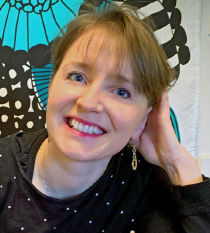 Inna Polichtchouk is an ECMWF expert on dynamics, an area particularly poor in female staff take up.
Inna Polichtchouk is an ECMWF expert on dynamics, an area particularly poor in female staff take up.
“As a scientist in numerical methods I enjoy combining my passion for mathematics and atmospheric dynamics for practical purposes, namely improving the weather forecast. If I had to pinpoint one event that led me to the position I hold today, this would be the model inter-comparison study I performed during my PhD. My research revealed shortcomings of different numerical techniques when used under conditions markedly different from Earth’s – this of course upset some senior people in the field – leading to difficulties in publishing my work. But during this time, I not only learned a lot about different numerical methods but also to trust my own instincts: ultimately you know your research the best! Generally, I have had the opportunity to work with some extremely inspiring scientists who have encouraged me to pursue a career in dynamics.
I would now like to inspire other women to study dynamics. Specifically, I would like to encourage those who are most interested in this field to look at the evolution of the stratospheric polar vortex during sudden stratospheric warming events when the intricate interplay of waves and background flow takes place. You won’t regret it.”
